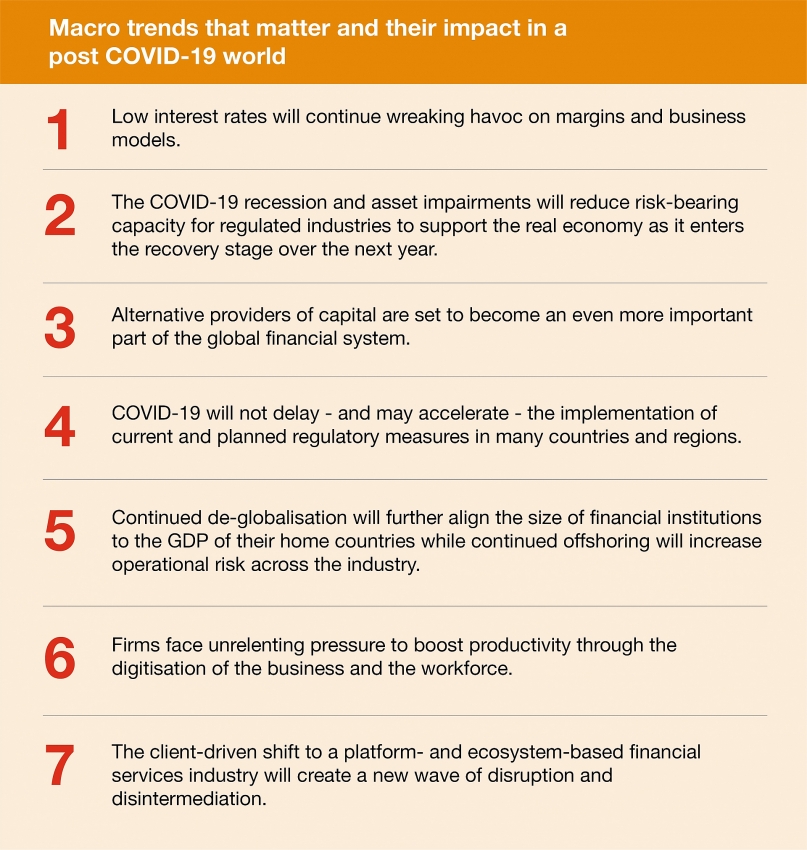PwC releases report on macro trends in financial services industry post-COVID-19
 |
| The macro trends in the financial services industry post-COVID based on the latest PwC report |
The report is PwC’s analysis based on a wealth of data of global financial institutions in the past three years.
The report findings indicate that even though the pandemic has heavily disrupted many industries, it had a relatively modest and mixed impact on the financial services industry.
Higher trading revenues due to market volatility have boosted capital markets businesses. Insurers have benefitted from consumers staying close to home and the subsequent reduced claims frequency in personal lines.
As for banks, central bank incentives and government support for businesses and individuals have so far limited damage to bank balance sheets.
In Vietnam, notable incentives have been timely issued by the government and the central bank (SBV), such as deferred tax payment and extension of deadline for land rental payment under governmental Decree 41/2020/ND-CP dated April 2020, and Circular No. 01/2020/TT-NHNN dated May 2020 of the SBV to restructure the repayment periods, waive and reduce the interest and fees to support customers affected by COVID-19. Such relief has prevented the types of contagion seen during the global financial crisis in 2008.
Analysis, however, presents that the financial services sector will be hardest hit by so-called second-order effects. That is, the deteriorating credit quality of customers, along with the continued low interest rate environment, as the pandemic and its aftereffects will be felt throughout the real economy over the next several years.
| The shift to a more platform- and ecosystem-based industry, including more digitised client interactions, will create a new set of challenges and opportunities for the financial industry. |
Dinh Hong Hanh, leader of Financial Services at PwC Vietnam commented: “Without doubt, the COVID-19 pandemic has tangibly affected the pockets of both retail and corporate consumers of financial services."
“In Vietnam, with the timely and effective support from the government, the financial industry is not seeing any significant downside compared to the rest of the economy. However, there remain lurking concerns as to what would happen when these delayed impacts materialise.”
While the impacts on different segments of financial services might vary, in the wake of COVID-19, financial services are not exempted from inevitable shifts and trends of transformation to ensure business continuity and prioritise productivity.
The move to digital has been accelerated during these disruptive times. The report argues that a combination of near zero interest rates and the rise of digital-only players will create tighter margins across product portfolios, thereby emphasising the need to digitise rapidly, gain cost efficiencies, and register real gains in productivity.
The shift to a more platform- and ecosystem-based industry, including more digitised client interactions, will create a new set of challenges and opportunities for the industry.
“This is a challenging yet exceptional time. Financial institutions need to re-evaluate and lead the use of technology to develop new capabilities – improve customers’ financial health, inclusion, and protection – and at the same time have a sound financial well-being strategy in place,” added Hanh.
John Garvey, PwC’s Global Financial Services leader, stated: “While the financial services industry has stood up well in light of the pandemic, it will likely be hit the hardest by second-order effects. The challenge for the financial services industry is in how it is able to navigate this difficult environment while balancing cost cutting and investment. Those that execute best will be the ones to succeed.”
What the stars mean:
★ Poor ★ ★ Promising ★★★ Good ★★★★ Very good ★★★★★ Exceptional
Related Contents
Latest News
More News
- Citi economists project robust Vietnam economic growth in 2026 (February 14, 2026 | 18:00)
- Sustaining high growth must be balanced in stable manner (February 14, 2026 | 09:00)
- From 5G to 6G: how AI is shaping Vietnam’s path to digital leadership (February 13, 2026 | 10:59)
- Cooperation must align with Vietnam’s long-term ambitions (February 13, 2026 | 09:00)
- Need-to-know aspects ahead of AI law (February 13, 2026 | 08:00)
- Legalities to early operations for Vietnam’s IFC (February 11, 2026 | 12:17)
- Foreign-language trademarks gain traction in Vietnam (February 06, 2026 | 09:26)
- Offshore structuring and the Singapore holding route (February 02, 2026 | 10:39)
- Vietnam enters new development era: Russian scholar (January 25, 2026 | 10:08)
- 14th National Party Congress marks new era, expands Vietnam’s global role: Australian scholar (January 25, 2026 | 09:54)

 Tag:
Tag:

























 Mobile Version
Mobile Version